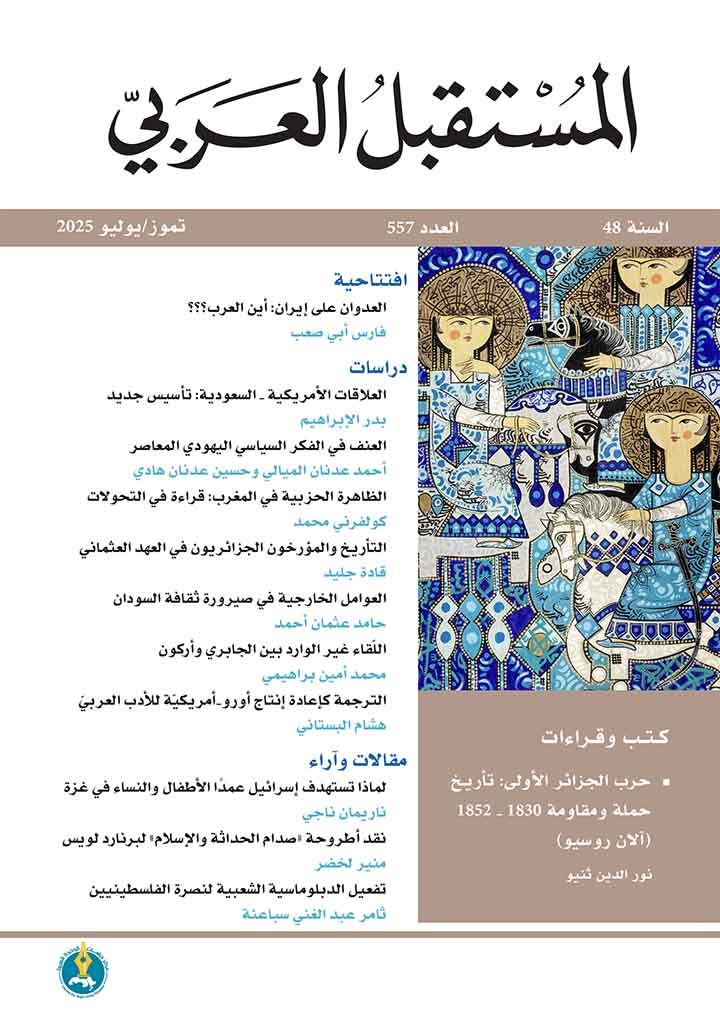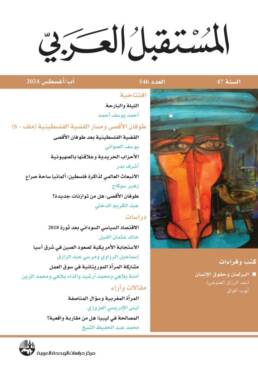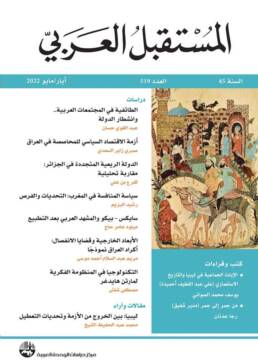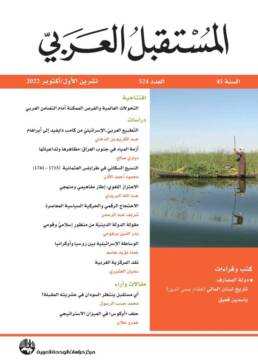Editorial
⬜ The American-Israeli Aggression Against Iran:
Where Are the Arabs??? Fares Abi Saad 7
⬛ Studies
⬜ U.S.–Saudi Relations: In Search of
a New Foundation Badr Al-Ibrahim 13
This study analyzes the challenges facing the relationship between the Kingdom of Saudi Arabia and the United States, with a focus on attempts to renew this relationship through a normalization deal with Israel. The proposed deal includes a defense agreement between the two countries, but also faces numerous obstacles and limitations regarding what it can realistically deliver.
The study draws on the theoretical framework of realism in international relations, which posits that relationships between states are based on the exchange of interests, power, and security concerns. It explores the evolution of U.S.–Saudi relations since the 1945 «Quincy Meeting,» highlighting their partnership in confronting common adversaries. The analysis also addresses the new requirements emerging for each side, revisiting the traditional «oil-for-security» equation in light of global changes, such as the rise of China.
Keywords: Saudi Arabia, Israel, Normalization, Oil, Security, economic interests.
⬜ Violence in Contemporary Jewish Political
Thought Ahmed Adnan Al-Miyali and Hussein Adnan Hadi 32
Violence represents one of the most significant and controversial dimensions in contemporary Jewish political thought. It is perhaps among the most criticized and debated ideas due to its profound political, social, and economic implications. This study addresses the critique of violence as a political dimension and a fundamental pillar of Zionist ideology and Israeli policies. Israel has managed to translate Zionist political thought into effective policies, which in turn has prompted Jewish intellectuals to critically examine the foundations and principles of violence within Zionist thought.
The research begins with a critique of the origins and dialectics of violence in Judaism and proceeds to analyze its central pillars—such as the concept of anti-Semitism, the Holocaust, holy war, occupation, and settlement in the lands of historical Palestine.
Keywords: critique of violence, holy war, Palestine, Greater Israel, Holocaust, contemporary Jewish thought.
⬜ The Party Phenomenon in Morocco: A Reading of
Transformations Goufferni Mohammed 50
The 1990s witnessed both international and domestic transformations that influenced the orientation and structure of Moroccan political parties, especially those on the left. Among the most significant developments were the global collapse of the socialist bloc and the Moroccan monarchy’s efforts to establish mechanisms of oversight and non-competitive participation in response to the challenge of political succession.
Moroccan political parties have long been viewed through a negative lens—both in political discourse and academic study—which has led to theoretical stagnation and the transformation of several political organizations from activist-based parties into elite-driven patronage parties. This shift has had a tangible impact on political activism.
A scientific engagement with these transformations requires moving beyond dominant analytical frameworks. The study calls for a sociological approach and field-based research to develop new analytical models that better reflect the current reality of Moroccan political parties.
Keywords: political parties, structure of political opportunities, activist parties, elite parties, party socialization, political struggle.
⬜ History and Algerian Historians During the Ottoman Era
(1518–1830) Qadah Jaleed 63
The Ottoman period in Algeria (1518–1830) is considered one of the most challenging eras in Algerian history, largely due to the French colonial effort to erase the identity of this period. This has made studying this historical phase particularly difficult, as researchers often lack adequate documentation.
Despite these challenges, some Algerian historians succeeded in recording significant events from the Ottoman era, though they did so using the methodologies of their time, when history as a discipline was marginalized in favor of religious sciences and the spread of Sufism.
This difficult reality has led Algerian historians to acknowledge a hard truth: the Ottoman era in Algeria remains largely unknown in its full dimensions and manifestations.
Keywords: history, Algerian historians, Ottoman era, Ibn Khaldun, civilizational gap, Sufism.
⬜ The Role of External Factors in the Evolution of Sudanese Peoples’
Culture: A Historical-Analytical Study Hamed Othman Ahmed 75
This study explores the impact of external factors on the development and evolution of Sudanese culture. It identifies three major external waves that have significantly contributed to shaping and reshaping the cultural foundations shared among Sudan’s diverse peoples.
The first wave predates British colonialism, during which influences from Sudan’s surrounding geographic environment played a crucial role in forming the early foundations of Sudanese culture. The second wave corresponds to the British colonial era (1896–1956), which brought about profound changes and redefined many of the cultural commonalities established during the first wave. The third wave began in 1997 with the advent of the information and communication revolution in Sudan. Globalization, through its various tools and technologies, enabled Sudanese communities to engage with each other and connect with the wider world.
Keywords: external factors, Sudanese peoples, cultural commonalities, British colonialism, globalization, historical-analytical method.
⬜ The Unlikely Encounter Between Mohammed Abed al-Jabri and
Mohammed Arkoun: A Comparative Analysis
(Translated by Ezzedin Kebsi) Mohammed Amine Brahimi 91
While Mohammed Abed al-Jabri viewed heritage as a fundamental component of Arab-Islamic identity—something to be critically and rationally examined—Mohammed Arkoun rejected heritage altogether, seeing it as an obstacle to modernity and civilizational progress. Al-Jabri appears deeply rooted in his Arab and Islamic
identity, whereas Arkoun seems more aligned with the French academic field, which regards heritage merely as an object of study rather than a living tradition.
This divergence marks the fundamental difference between the two thinkers. Their only real point of convergence is their shared historical context—the post-independence era. Both produced their intellectual work in the aftermath of the 1967 defeat, which served as a catalyst for rethinking inherited traditions in an attempt to envision the future.
Keywords: al-Jabri, Arkoun, heritage, modernity, rationalism, identity, Arab philosophy.
⬜ Subjugating Perspective: Translation and Editing as Euro-American
Reproduction of Arabic Literature Hisham Bustani 110
This paper examines how the processes of translation and editing reshape and subjugate the perspectives expressed in literary writing from the Global South when transmitted to the Global North. It explores how these texts are often adapted to align with the dominant Euro-American worldview.
The article analyzes three main reference frameworks that shape perceptions of the world and how they are dealt with in translations—particularly into English and more broadly into European languages. The paper concludes by viewing translation and editing as two domains of erasure, aimed at recreating and reinforcing the «Self» through a process that establishes and coincides with the entrenchment of preconceived notions about the «Other.» It also explores how translation and editing can function as a double-edged sword.
Keywords: translation, editing, Euro-American centrality, Arabic literature, subjugation of perspective.
⬛ Articles and Opinions
⬜ Why Does Israel Deliberately Target Children and
Women in Gaza Nariman Naji 125
⬜ The «Clash of Modernity and Islam» Thesis by
Bernard Lewis: A Critical Perspective Mounir Lakhdar 134
⬜ Activating Public Diplomacy to Support Palestinians in the Al-Aqsa
Flood Thamer Abdul Ghani Sabaaneh 146
⬛ Books and Readings
⬜ The First Algerian War: History of the Campaign and Resistance
1830-1852 (Alain Roux) Reviewed by: Nour Eddine Thaniou 156
⬜ Selected Arabic and Foreign Books
and Research Reports Gaby El-Khoury 162
Arabic Books: From the Ailbon Tunnel to the Al-Aqsa Flood… A Discussion on the Tragic Journey of the Palestinian National Movement; Gulf Cooperation Council: Between Economic Diversification and an Uncertain Future; Shifting Sands: Changes in Deterrence in the Middle East; Energy in the Age of Artificial Intelligence: Smart Technologies and the Reengineering of Traditional Sources
Foreign Books: Democracy and Social Rights: A Path Toward Equality?; China in Iraq after the War: From Underdog to Unassailable; Police Abuse and Reform in America: Examining the Facts; The Migration Question: Politics, Economics and the Failure of Border Security
Research Reports: «Without Accountability, Syria’s Sectarian Violence Will Only Worsen»; «America’s War with Iran: What Comes After U.S. Strikes»
Add a review
You must be logged in to post a review.








